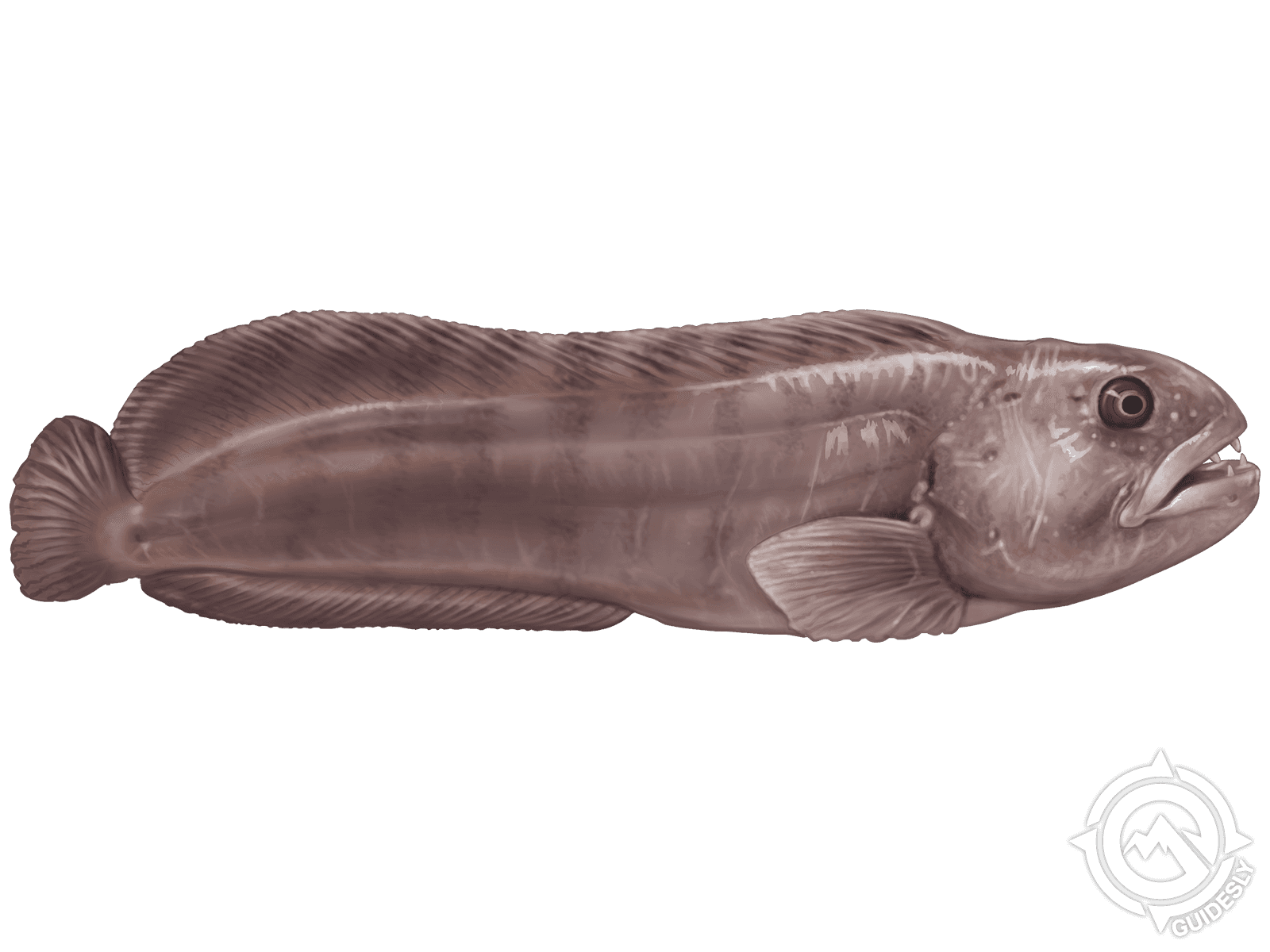Atlantic Wolffish

Species Details
Anarhichas Lupus
Anarhichadidae
Perciformes
Nearshore, Offshore, Ocean Floor
10 - 40 lbs.
36" - 60"
Atlantic Wolffish (Anarhichas lupus) Fish Description
The Atlantic Wolffish (Anarhichas lupus) is a fairly large fish in the North Atlantic Ocean. It can easily be recognized through its rather menacing appearance, thanks mainly to the rows of large teeth sticking out of its large mouth. Its head is quite large in comparison to its long body that gradually tapers to the tail. Its color is mostly a dull bluish gray that is much darker on top as compared to the lighter hue of its underside. The fins, including the caudal and the dorsal fin that runs down its back, have that same dull gray coloration although they’re sometimes a bit darker. Another distinguishing feature this fish has is the uneven vertical stripes that are much darker in color running across its entire body—from the head to the base of the tail fin.
Given their rather intimidating appearance, you might think that this fish can be a voracious predator—and you’re right about that. Thanks to its large teeth and strong jaws, it can easily crush its favorite fares of bottom-dwelling hard-bodied or spiny invertebrates, including scallops, mussels, clams, sea urchins, starfish, crabs, sea snails, and slugs. They aren’t considered dangerous to humans though as they are not known to attack us—unless, of course, provoked. They are known to be shy and reclusive.
The Atlantic Wolffish usually mates from September to October every year. While they are mostly sedentary and prefer to be alone most of the time, they would pair up to breed during spawning season. Males would then guard their nest for months even after the eggs are hatched. They would only leave their brood when the young ones are big and strong enough to survive on themselves.
Atlantic Wolffish Interesting Facts
- The largest recorded Atlantic Wolffish measures five feet long and weighs about forty pounds.
- They have some sort of anti-freezing agents in their blood that allows them to survive living in freezing cold temperatures.
- They prefer living a solitary life for most of the year until the spawning season comes from when they pair up with the opposite sex.
- Unlike other fish species that release their eggs into the open water to fertilize, the Atlantic Wolffish fertilizes their eggs internally.
- Males are known to stay in the nest and protect their eggs as well as newborns for months until they are big and strong enough to survive.
- The Atlantic Wolffish is not known to eat other fish species.
- They don’t have predators except for Atlantic Cods, which feed on the young ones.
- Populations are currently under the management of authorities due to a recorded steep decline in the past few decades.
- Their population has seen a drastic decline due to overfishing.
- Annual limits for number of catch and size were placed to help the population recover.
- Permits are also required for commercial fisheries.
Atlantic Wolffish Size and Swimming Speed
The Atlantic Wolffish usually weighs ten to forty pounds and measures between two to four feet long on average. There are no known data about their average swimming speeds yet but it wouldn’t factor much if you’re targeting this fish as it’s not known to be a fast swimmer.
Atlantic Wolffish Habitat and Distribution
The Atlantic Wolffish can be found far and wide across both sides of the North Atlantic as well as some parts of the Arctic. In North America, the species can be seen as far north as Labrador and Newfoundland in Canada stretching as south as Massachusetts, with known dense populations in the Gulf of Maine, Bay of Fundy, Georges Bank, Cape Cod, and Great South Channel.
The Atlantic Wolffish is also benthic, or they live right down there at the bottom. They are usually found in waters as deep as two hundred fifty to more than a thousand feet. They also prefer to inhabit rock formations and caves where they usually live alone, only going out from time to time to look for food.
Atlantic Wolffish Shark Fishing Tips
Because the Atlantic Wolffish is known to be a voracious predator, you can pretty much expect them to bight whatever bait you might have with you. Just keep in mind that this fish doesn’t eat other fish so you should opt for lures that don’t mimic fish. Artificial lures that can be used are deep spoons or jigs. Most anglers targeting this fish, however, prefer using clams and have been successful with them. Given their habitat deep in the water, you will also need a solid 10-20 ounce lead sinker for you to be able to present your bait near your target.






